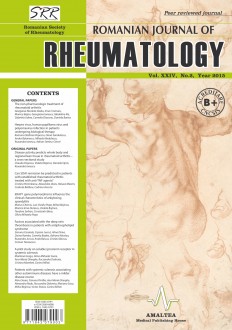SELECT ISSUE

Indexed

| |

|
|
|
| |
|
|
|

|
|
|
|
|
|
| |
|
|
HIGHLIGHTS
National Awards “Science and Research”
NEW! RJR has announced the annually National Award for "Science and Research" for the best scientific articles published throughout the year in the official journal.
Read the Recommendations for the Conduct, Reporting, Editing, and Publication of Scholarly work in Medical Journals.
The published medical research literature is a global public good. Medical journal editors have a social responsibility to promote global health by publishing, whenever possible, research that furthers health worldwide.
PATIENTS WITH SYSTEMIC SCLEROSIS ASSOCIATING OTHER AUTOIMMUNE DISEASES HAVE A MILDER DISEASE COURSE
Alina-Mihaela Soare, Simona Pintilie, Ana Maria Gherghe, Alexandra Radu, Rucsandra Dobrota, Mariana Sasu, Mihai Bojinca, Victor Stoica and Carina Mihai
ABSTRACT
Background and objectives. Systemic sclerosis (SSc) is a multisystem connective tissue disease (CTD), being one of the most heterogeneous diseases of the spectrum of CTDs. It may associate other autoimmune diseases (AIDs), therefore in this study we aimed to evaluate the prevalence of other AIDs in a cohort of patients with SSc and to evaluate their prognosis in comparison to patients with SSc without this association.
Patients and methods. We performed a retrospective study in patients with SSc satisfying the ACR 1980 or the ACR/EULAR 2013 criteria, who were evaluated between January 2005 and May 2014 in our SSc center. These patients were investigated according to the EUSTAR recommendations, including modified Rodnan Skin Score (mRSS), lung function tests (LFT), echocardiography etc. As a control group for evaluating the prevalence of the AIDs we used all patients with Rheumatoid Arthritis (RA) visiting our clinic between January-December 2005. Data of all RA patients were collected from the electronic database of the hospital. All AIDs mentioned in the discharge diagnoses were recorded. Between-group comparisons were made with the chi-square test for nominal variables and with the independent-sample t-test for numeric variables.
Results. 144 patients with SSc were included: 88.8% females, 66.6% with the limited cutaneous subset of disease (lcSSc), mean age 53.9 ± 12.8 years, mean disease duration at study enrollment 5.1±10.5 years and a mean follow-up time of 3.7 ± 2.6 years. Prevalence of the AID in the SSc cohort was 19.4%, patients with lcSSc being more prone to associate other AID (p = 0.001). We noted a tendency towards less interstitial lung disease (p = 0.056) and less digital ulcers (p = 0.081) in patients with SSc and AIDs. Comparing skin involvement for each year of follow-up in patients with SSc with and without and AIDs we observed that the first tended to have lower and more stable values of the mRSS.
Conclusion. Patients with SSc and AIDs tend to have a better outcome than the ones without this association. mRSS remains stable across the years in patients with SSc and AID, with lower values than the SSc patients.
Keywords: systemic sclerosis, autoimmune disease, polyautoimmunity
